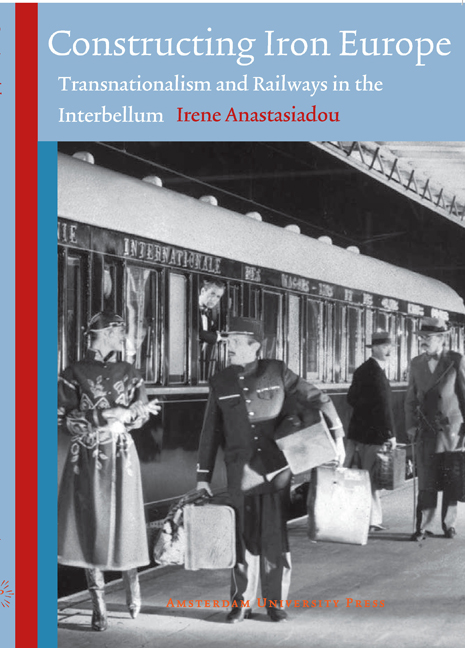Book contents
- Frontmatter
- Acknowledgements
- Contents
- Abbreviations
- 1 Introduction
- 2 Europe in Crisis and Railway Visions
- 3 Shifting Railway Regime
- 4 European Integration, European Fragmentation
- 5 Constructing the National, Constructing the European: Greece
- 6 Uncovering Railway Europe
- Bibliography
- Summary
- Curriculum Vitae
- Appendix I Timeline of Conferences and Conventions held in the Early years After the war, Concerning Railways:
- Appendix II Schedule of International Expresses in the 1930s
- Appendix III List of Illustrations
5 - Constructing the National, Constructing the European: Greece
- Frontmatter
- Acknowledgements
- Contents
- Abbreviations
- 1 Introduction
- 2 Europe in Crisis and Railway Visions
- 3 Shifting Railway Regime
- 4 European Integration, European Fragmentation
- 5 Constructing the National, Constructing the European: Greece
- 6 Uncovering Railway Europe
- Bibliography
- Summary
- Curriculum Vitae
- Appendix I Timeline of Conferences and Conventions held in the Early years After the war, Concerning Railways:
- Appendix II Schedule of International Expresses in the 1930s
- Appendix III List of Illustrations
Summary
Internationalism within Nation State
In this fifth chapter, I focus my analysis within a single nation-state. As I mentioned in the introduction, historiography on the internationalization of railways usually assumes that national considerations preceded international ones in the development of the railway networks. In this chapter, I investigate to what degree international considerations formed part of the negotiations on the shape of railways within a national context, and eventually influenced the shape of national railway networks. The consequence of such an argument is that the internationalization of railways actually often started within the nation state. Historiographically, I argue here that the study of the configuration and development of national railway networks within the context of general European developments does shed light on the role of railways as a means of integrating regions, nations and transnational alliances within Europe. National and international were not always two conflicting spheres of interest. Instead, looking at national developments allows us to observe that often the integrating role of railways in a national sphere was closely related to ideas and visions for integrating nations into broader transnational alliances.
I have chosen to look at the case of Greece. The case of Greece is interesting for several reasons. First because Greece in the nineteenth century, due to its geographical position being geographically situated further away from the Austro- Hungarian Empire than the rest of the Balkan Countries provided a space where nascent nineteenth century transnational alliances competed in terms of their access to the East. After WWI, when the Greek territory expanded, many Greek engineers proposed plans for the completion of the Greek railroad network, attempting to position the country on the ‘proposed’ and internationally debated southern international railway artery. Consequently, the case of Greece allows us to see how the international projects earlier discussed in this book were received within the national context. Secondly, the case of Greece also allows us to examine how the construction of the modern nation state coincided with projects for the construction of railway arteries that not only would better integrate the different regions of the country, but also better integrate the country with international traffic of commerce.
- Type
- Chapter
- Information
- Constructing Iron EuropeTransnationalism and Railways in the Interbellum, pp. 201 - 242Publisher: Amsterdam University PressPrint publication year: 2012



